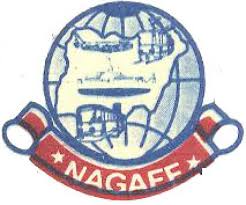As Nigeria continues to mark its 60th Independence Anniversary celebration, the National Association of Government Approved Freight Forwarders (NAGAFF) has noted with disappointment that the yearly budgetary allocations for the maritime industry following the return to a democratic rule in 1999 and the physical infrastructure on ground, do not match.
The National President of NAGAFF, Chief Increase Uche who made the observation in a goodwill message to Nigerians on the occasion of the 60th Independence Anniversary regretted that the maritime industry had failed to create the desired job opportunities for the teeming graduates per year, due to the misplacement of priorities.
This, Uche believed also accounts for the non-maximization of potential revenue inherent in the industry.
He added that it was not an overstatement to admit that subsequent leaderships (military and civilian) lost the national developmental vision of our founding fathers.
Analysing the indicators that ordinarily aid national maritime planning and even development, the NAGAFF National President said, “Oil and Gas Sector – Though seemingly active as major revenue earner, but the essence is defeated, as National Refineries continue to fail to meet the expectations of Nigerians while protecting the selfish interest of oil marketers
“Transport Infrastructures / Port Interconnectivity – The Transport Infrastructure for Interconnectivity is still in a poor state, Ports are not evenly linked to rail transport. Port access roads remain death traps-loss of financial investment, promoting exploitation / extortion and revenue leakages, high dwell time of ships at berth and cargo at the terminals, etc.
“Steel sector – the aims have been defeated. It is still in comatose state. Though a major employer of labour, due to its related service sectors, but not exploited.
“Automotive industry – The aims and objectives of the first National Automotive Development Policy have been defeated. Efforts towards its revamp is progressively on-going via Private Interventions.
“Ship Repair Yards/ Dock Yard – Unstructured concessioning undertaken, performing far below average. Ship building vision altered by ship acquisitions. Most visiting ships carriers prefer to bunker (refueling) in the neighbouring countries, other than bunkering in Nigeria.
“Port Industry Expansion / Development – Inherited National Ports Concessioning, 3 Deep Sea Ports underway while conventional Green Port Development is under-utilized. Post concession, the pace of investment into the port infrastructure development does not correspond with the pace of profit recoupment, simply a paradigm shift from public monopoly to private oligopoly,
“Shipping Industry – All the inherited National Carrier (Ships) have been sold. Nigeria now a maritime nation without national carrier (Fleets Flying its Flag plying the international deep blues), though private concerns deploy various sizes of Floating platforms. Today, Nigeria Shippers are presently grappling with the incidences international shipping monopoly.
“National Fishing Industry – The Industry is suffering serious neglect, as the few trawlers fishing to maximally cover our sea nautical miles are grossly inadequate, hence, being exposed to the activities of the international poachers. Fish imports are on the increase, while so many indigenous fishing companies have folded up.
“National Seafarers Pools – The sector is highly underutilized, lacking global competitive edge due to absence of national carriers that will aid prompt high sea experience training.
“National Marine Archeologist/Divers – Under-utilized and uncompetitive.
“Freight Forwarding Sector – This sector sadly is suffering the effects of lack of professional training. Foreigners’ involvement is on the increase.
“National Dockworkers – Seemingly active, but handle more of imports operations. Not much activity in the export segment
“Agricultural produce / cold logistics export activities – below average.
“Solid minerals exporting activities – Grossly under-utilized
“Maritime training institutions /capacity building and exchange of expertise – not on the average.
“Safety and security of our marine domain /territorial water control: Performance – a little above average performance with notable rescue and intervention activities. Piracy attack still very common, reasonable investment in security platforms on contract basis.”
He therefore called on leaders to stop playing lip service to the development of the sector and show more commitment towards revamping the maritime industry even as he maintained that the executive and legislature should desist from playing to the gallery of deploying a piece meal developmental approach in the maritime industry.
“The Executive and legislature should review and think out a holistic national development plan/program for our maritime industry. National interest should be paramount far above parochial /political considerations in all policy and administrative concerns.
“60 years of Independence, we indeed missed the track pursuance to our maritime developmental objectives. This notwithstanding, we can collectively resolve to revamp the industry. The potentials to attaining most efficient and viable maritime nation are very much possible”, he concluded.
Send your news, press releases/articles to augustinenwadinamuo@yahoo.com. Also, follow us on Twitter @ptreporters and on Facebook on facebook.com/primetimereporters or call the editor on 07030661526, 08053908817.

